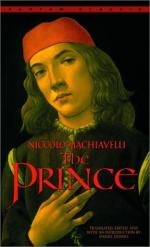
|
| Name: _________________________ | Period: ___________________ |
This quiz consists of 5 multiple choice and 5 short answer questions through Chapter 17.
Multiple Choice Questions
1. How does Machiavelli define avarice?
(a) Being of the disposition to take what is not one's own.
(b) Being miserly and not generous enough.
(c) Being so generous that he has nothing left.
(d) Being nothing but a warrior.
2. Who can successfully gain the reputation for generosity but not ruin himself in the process?
(a) A prince who gives away someone else's money.
(b) A prince who goes to war to create jobs for his subjects.
(c) A prince who only gives when he can expect a generous return.
(d) A prince who has unlimited resources.
3. What powerful force does Machiavelli say can efface innovations in government?
(a) Memories.
(b) More and more innovation.
(c) Expectations.
(d) Disdain for the past.
4. How does Machiavelli say a private citizen might make himself a prince?
(a) By avoiding war and promoting peace.
(b) By becoming proficient in war and rising in rank.
(c) By becoming a puppet of an enemy military.
(d) By hiring his own mercenaries.
5. How does Machiavelli define a new princedom or dominion?
(a) One that does not come from a long line of ruling ancestors.
(b) One that kills all the citizens of the old regime.
(c) One that is an entirely new settlement.
(d) One that comes from political intrigue.
Short Answer Questions
1. Why does Machiavelli say that Prince Lorenzo should not be surprised at what he is saying about new princedoms?
2. What does Machiavelli say is the only art expected of a prince?
3. What is it that Machiavelli prizes most of his possessions?
4. In the event that the prince cannot afford a large army, what should he do?
5. Why is setting up a system of government using conquered citizens effective?
|
This section contains 410 words (approx. 2 pages at 300 words per page) |

|




